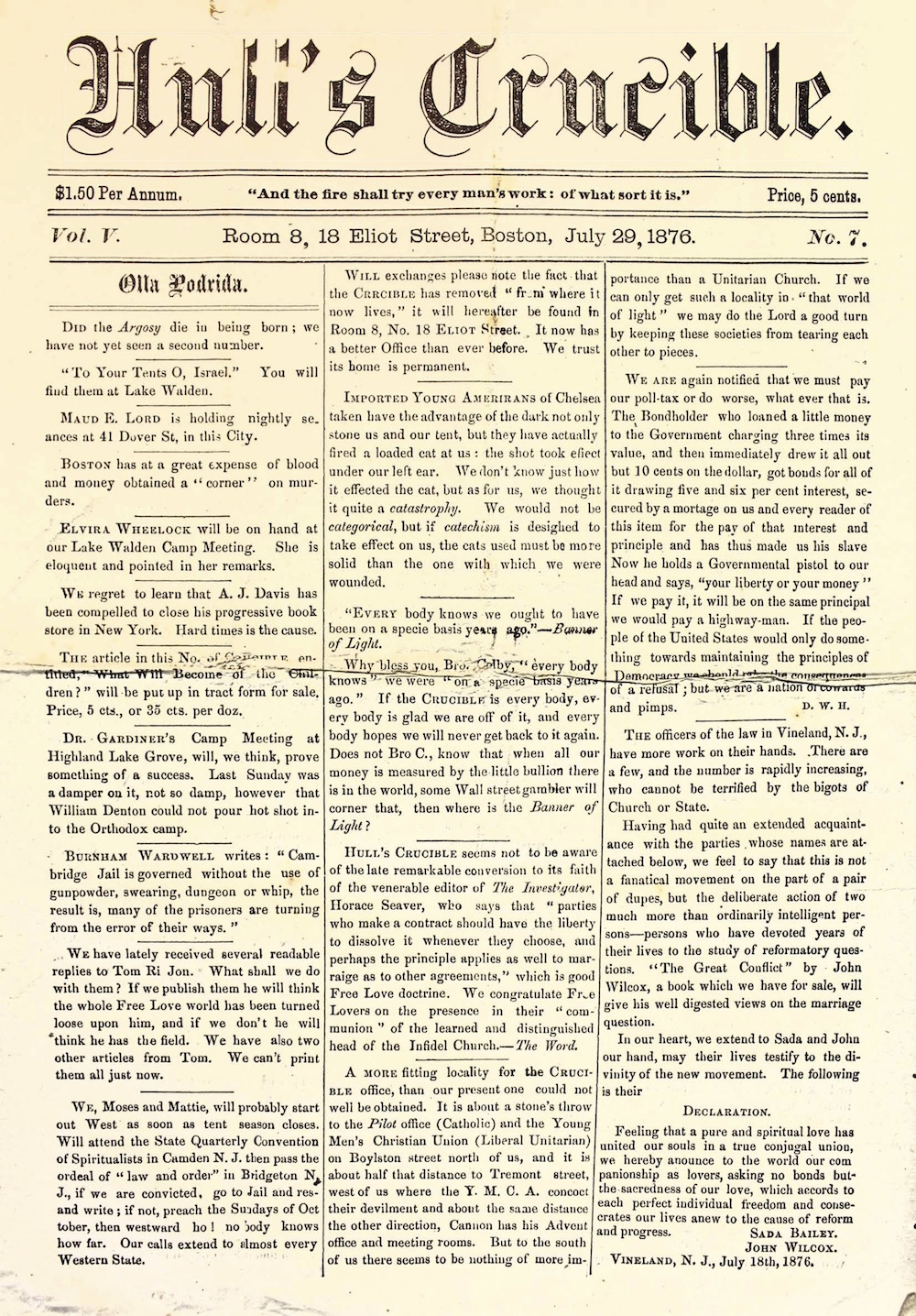

|
| About | Archives | Practices | Contribute | Contacts | Search |
| Periodical: | The Crucible |

|
|
| Summary: |
From Pat Deveney's database:
Hull's Crucible. 1/1, 1871-7/11, November 10, 1877. 8 pp., 12 x 16, 23 x 32. $2.-$2.50 a year. This was a radical, free-love oriented journal that Hull began in Baltimore as the Crucible. The tenor of the original journal is revealed by the fact that one of its first editors was A. Briggs Davis, who was corresponding secretary of Section 40, one of the two Marxist Internationals of Baltimore at the time. Hull was soon removed from control by the organizers, who merged the rump of the journal into Woodhull and Claflin's Weekly in 1872. Hull moved to Boston and restarted the journal as Hull's Crucible in January 1874. The journal featured contributions by all of the leading radical (i.e., free-love) spiritualists, including W.F. Jamieson, J.H.W. Toohey, Lois Waisbrooker, Anthony Higgins, Austin Kent, et al. Moses Hull (1835-1907) plays an important role in spiritualism, more for the longevity of his service and his open advocacy of free love than for other accomplishments. In his early twenties, He embraced the revelations of Ellen G. White's Seventh Day Adventists, lecturing and preaching (as a "boy preacher") widely on the virtues of Adventism, and then in 1862 he was converted to spiritualism while debating the medium W.F. Jamieson (a debate that was later published). Both were advocates of the radical freedom / free love wing of spiritualism, and the two later edited the Spiritual Rostrum and each contributed to journals edited by the other, including Hull's earlier Progressive Age of Kalamazoo, Michigan, and Hull's Crucible. Hull's views on free love were more than theoretical. In a famous letter to Woodhull & Claflin's Weekly in 1873, he gloried that in his lecture touring away from home he had finally begun to follow God's commands, not those of men, by assenting to the attraction he felt towards women: "I humbly and prayerfully yielded to the diviner impulses of my soul, and found that peace, happiness and intellectual growth for which I craved. I felt that I had been baptized with a diviner baptism, had reached a higher and purer life, had entered the 'Holy of Holies,' and found a divine benediction that never was reached by one who had not traveled the same road." Hull, "A Personal Experience," Woodhull & Claflin's Weekly (August 23, 1873). Although his second wife, Elvira, followed this up with a letter of her own agreeing with Hull's sentiments, Hull soon left her and scandalously moved in with Mattie Sawyer, letting the world know, as Ezra Heywood's The Word announced in 1875, that they "propose to live together as they please without asking leave of a minister, or that intrusive stupidity known as statute law . . . ." This open acknowledgment of what many in the spiritualist community secretly believed, led to a virtual banishment from the spiritualist lecture circuit for Hull and his new wife (Mattie Sawyer, whom he eventually married) that lasted almost until the 1890s-though Hull threatened retaliation in the Crucible in 1877: "We hold damning facts about nearly all of the Spiritualist lecturers." Ostracized, Hull supported himself by his lecturing and writing on "progressive" topics, and published books on his debates and speeches on Christianity, the Bible's relationship to spiritualism, a defense of Victoria C. Woodhull as a free-love advocate, and the supremacy of reason. He also wrote several forgotten novels. In the 1880s and 1890s Hull edited New Thought (Des Moines, Iowa, and then Chicago, Illinois), "Devoted to Spiritualism and General Religious and Political Reform," and to "Spiritualism in its Higher Aspects." Late in his life, in 1903, he was rehabilitated by the spiritualists generally and became head of the Morris Pratt Institute in Wisconsin, a school formed to train mediums. Mattie went on to edit The Lyceum Herald for children, as she had regularly contributed a page, "Our Lyceum," to Hull's Crucible. In his career, Hull published also The Progressive Age, The New Monthly Clairon and New Thought. Hull's Crucible certainly lasted until the fall of 1877, but references to it in the newspaper directories appear as late as 1879. NYPL microfilm; NSAC Lily Dale (May 14, 1877-August 25, 1877); Harvard University; Yale University; University of Michigan; American Antiquarian Society; University of Rochester. |
| Issues: | Hull's Crucible Sep 1871 |
| Hulls Crucible V3 N7 May 14 1874 | |
| Hulls Crucible V4 N11 Oct 15 1875 | |
| Hulls Crucible V4 N12 Nov 1 1875 | |
| Hulls Crucible V4 N16 Jan 15 1876 | |
| Hulls Crucible V4 N17 Feb 1 1876 | |
| Hulls Crucible V4 N21 Apr 15 1876 | |
| Hulls Crucible V5 N17 Oct 7 1876 | |
| Hulls Crucible V5 N19 Oct 21 1876 | |
| Hulls Crucible V5 N5 Jul 15 1876 | |
| Hulls Crucible V5 N6 Jul 22 1876 | |
| Hulls Crucible V5 N7 Jul 29 1876 | |
| Hulls Crucible V6 N6 Feb 10 1877 | |
| Hulls Crucible V6 N18 May 5 1877 | |
| Hulls Crucible V6 N23 Jun 9 1877 | |
| Hulls Crucible V6 N25 Jun 23 1877 | |
| Hulls Crucible V6 N25 Jun 23 1877 B | |
| Hulls Crucible V7 N1 Jun 30 1877 | |
| Hulls Crucible V7 N2 Jul 14 1877 | |
| Hulls Crucible V7 N2 Jul 14 1877 B | |
| Hulls Crucible V7 N3 Jul 21 1877 | |
| Hulls Crucible V7 N5 Aug 4 1877 | |
| Hulls Crucible V7 N5 Aug 4 1877 B | |
| Hulls Crucible V7 N6 Aug 11 1877 | |
| Hulls Crucible V7 N8 Aug 25 1877 |
|
|